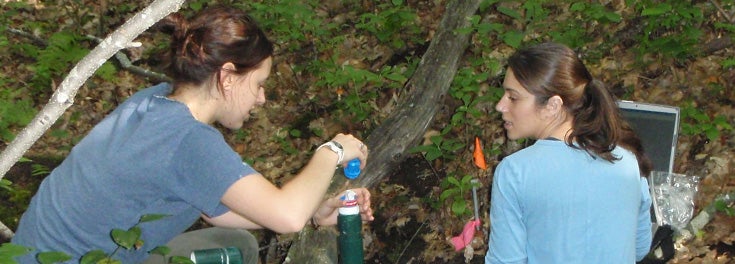
Environmental issues are hot these days (and we’re not just talking about global warming). For example, maybe you’re interested in stopping the spread of Lyme disease from tick bites, or helping farmers protect their livestock from killer parasites. Perhaps you’re intrigued by how lizards native to one country adapt to another. Or maybe you want to make sure marine food sources aren’t obliterated by non-native algae invasions. No matter what inspires your inquiring mind, our Coastal Fellows Program lets you put your head—and your hands—into finding solutions and asking new questions.
I had never worked in a lab before, but right off the bat I was doing fieldwork and lab work and really using what I learned in my biology and chemistry classes. It was a really valuable experience.
Take environmental science and management major Nate Winkler, who’s got a nose for soil. He started a landscaping business in middle school and plans to join the URI soil judging team (yes, that really exists) next year. But in the meantime he’s been getting noticed for his research proving the long-held belief that seaweed makes a great fertilizer.
“Seaweed is available on the beach, it’s free, and it’s a public nuisance. If farmers are educated about its use, maybe it will decrease their dependence on conventional fertilizer and lead to use of seaweed as a natural organic fertilizer instead,” Nate said.
As one of our successful Coastal Fellow applicants, Nate was paired with a faculty mentor and an established research team for eight months of hands-on learning experiences and project-related support. Coastal fellows take complete responsibility for one piece of the project’s overall research, dive right into the fieldwork, and follow it through to completion with a poster presentation of their research and findings.
“I had never worked in a lab before, but right off the bat I was doing fieldwork and lab work and really using what I learned in my biology and chemistry classes. It was a really valuable experience,” Nate said.
Marine biology major Chelsea Stephens tested a new method of fishing using a “hook blocker” designed to protect a rare shark that often gets inadvertently hooked in the gut when swallowing the bait and hook whole. The “hook blocker” she tested is a 10-inch piece of PVC pipe attached to the fishing line above the hook which gets caught in the corners of the shark’s mouth so the hook can’t go too far down its throat. It allows the shark to be released unharmed.
Working with URI lecturer Brad Wetherbee, Chelsea spent weeks in the Delaware Bay, putting out thousands of feet of fishing line with hundreds of baited hooks—half with hook blockers and half without. About 100 sharks were gut-hooked without the blockers, compared to only two with the blockers. “The blocker definitely worked, and now we want to let the scientific community and fisherman know they work and that they’re inexpensive and easy to use,” said Chelsea, whose poster presentation took first place among the 50 Coastal Fellows who exhibited their research last December.
Keri Dyer, who’s majoring in wildlife conservation biology, has done two Coastal Fellows projects—one analyzing the health of local salt marshes by catching and dissecting small baitfish called mummichogs, the other measuring the habitat needs of the New England cottontail. The experience she gained from these two very different research projects has convinced her that a career in environmental research is in her future. “I’ll work on whatever project they have and do whatever needs to be done. Just give me some bug spray,” she said.
The experience she gained from these two very different research projects has convinced her that a career in environmental research is in her future. “I’ll work on whatever project they have and do whatever needs to be done. Just give me some bug spray,” she said.
As students like Nate, Chelsea and Kerri show, our Coastal Fellows are really plugged into researching ideas on land and sea. They become expert problem solvers, innovators and discoverers adept at understanding emerging problems and finding answers. The global environment awaits their solutions, and yours.
Pictured above: URI Students Mary Guitierrez and Molly Welsh collecting sediment samples from a local stream. Their work with Professor Art Gold examines the effects of beaver ponds (which are formed when a beaver builds a dam) on climate change as a result of increased greenhouse gas emissions from the water.
